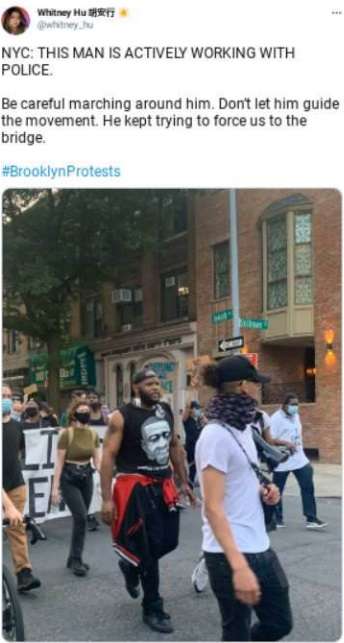The Volokh Conspiracy
Mostly law professors | Sometimes contrarian | Often libertarian | Always independent
Is It Libelous to Falsely Say Someone Is Working with the Police?
Special bonus connections: disbarred lawyers, Tupac Shakur, New York City political figures, and then-not-yet-Attorney-General Michael Mukasey.
Israel (Ace) Burns is a disbarred lawyer, who is also facing charges of terroristic threats to burn down the Diamond District for this statement:
Today, I'm giving a demonstration from Barclay's Center at 6 p.m. to City Hall, and that's the first stop—and we're hoping [Mayor] De Blasio and [Gov.] Cuomo come out and talk to us and give the youth some direction.
But if they don't, then [the] next stop is the Diamond District. And gasoline, thanks to Trump, is awfully cheap. So we're giving them a chance right now to do the right thing.
(He may be taking "Israel Burns" too literally.) Burns characterizes the prosecution as stemming from "the NYPD, the Jewish community and the Alt-right [taking] issue with Ace's wording and rhetoric." He also says,
You know, I'm a leader of this FTP movement. It means a lot of things. It can mean free the people, it can mean for the people, it could also mean fire to property—and that's very possible.
But he is also a "Brooklyn rapper and activist," who is now suing Whitney Hu—who was a N.Y. City Council candidate, and is now campaign manager for N.Y. mayoral candidate Dianne Morales—for defamation (and related torts). Hu and codefendant Grace Nam, Burns says, accused him of (1) "actively working with the police," and (2) being a "known aggressor and abuser."

Now one element of a defamation claim is that the statement must be "capable of a defamatory meaning"; and there are two different ways of understanding that, which might be called the "descriptive" and the "normative" (my own labels):
- Descriptive: The law might ask whether the statement would actually diminish the defendant's reputation among some sufficient portion of its audience.
- Normative: The law might ask whether the statement should diminish the defendant's reputation among some sufficient "right-thinking" portion of its audience.
This issue has arisen with regard to false accusations of homosexuality. In the past, such accusations used to be seen as actionable under either approach. But more recently some courts have concluded that false allegations of homosexuality are no longer defamatory (even if such allegations could indeed diminish the target in some people's eyes), at least unless specific damages are shown.
And the same is true, especially in New York, when it comes to allegations of working with the police:
In order to be libelous under New York law, a false statement must hold the plaintiff up to ridicule or scorn in the minds of "right-thinking persons"; those who would think ill of one who legitimately cooperates with law enforcement officials are not such persons.
That's from Agnant v. Shakur, written by then-Judge-later-Attorney-General Michael Mukasey, deciding a case about a song written by Tupac Shakur.
So the question that a court will presumably have to face, as to the "working with police" allegation, unless the case is dropped: In Burns' circle, it doubtless is bad for his reputation to be seen as working with the police; should that be enough to make the allegation actionably defamatory (if it's false)? And how do New York courts decide who is "right-thinking" these days?


Show Comments (31)